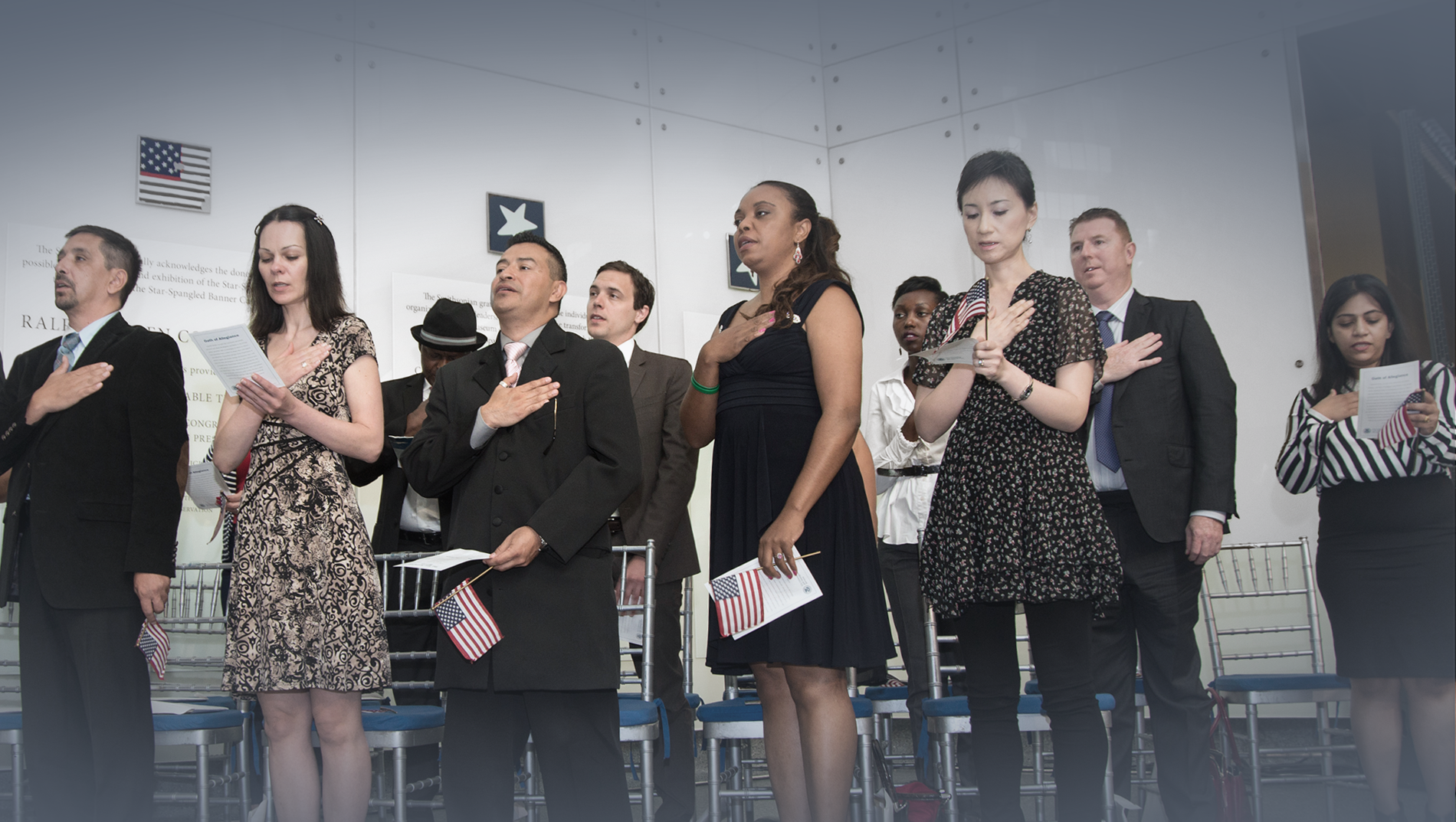Immigration 101
The U.S. immigration system is complex and can be difficult to understand. These resources provide key data points, historical information, and background on hot topics in immigration. Learn the basics about immigration. Immigration in the United States is complex and ever-evolving. Start here to understand the fundamental aspects of immigration policy, its history, and its impact on both individuals and the country at large. Learn commonly used terms about immigration law and how the U.S. immigration system is designed. Explore layered topics like how and whether immigrants can become citizens, as well as what individual protections look like under the law.
How the United States Immigration System Works
- How the Immigration System Works
- June 24, 2024
U.S. immigration law is very complex, and there is much confusion as to how it works. This fact sheet provides basic information…
Read More
Birthright Citizenship in the United States
- Birthright Citizenship
- October 16, 2024
This fact sheet explains birthright citizenship, the Fourteenth Amendment, and its interpretations. Who is…
Read More
Asylum in the United States
- Asylum
- August 27, 2014
Asylum seekers must navigate a difficult and complex process that can involve multiple government…
Read More
New Year, New Leadership and New Opportunities at DHS
The Department of Homeland Security enters 2014 with new leadership, following the confirmation this month of Jeh Johnson and Alejandro Mayorkas for Secretary and Deputy Secretary, respectively. Johnson and Mayorkas bring years of government service to their new jobs. Mayorkas’ tenure as Director of USCIS led to a far more open agency that treated the public as a partner, with innovations such as public comment on policy memos, expanded public engagement opportunities, the entrepreneur-in-residence program, and the delivery of a working program to process DACA applications within two months of the president’s announcement of the program. These successes, coupled with Johnson’s experience as the top Pentagon lawyer, promise a new direction for DHS. Read More

New ICE Deportation Statistics Are No Cause for Celebration
There is little to cheer in the new deportation statistics released by U.S. Immigration and Customs Enforcement (ICE). While the numbers document a 10 percent decline in the total number of deportations compared to last year, they also reveal the extent to which immigration enforcement resources are still devoted to apprehending, detaining, and deporting individuals who represent no conceivable threat to public safety or national security. In fact, the overwhelming majority of people deported by ICE either have no prior criminal record or were convicted of misdemeanors. While ICE does indeed capture and remove potentially dangerous individuals, most of its resources remain devoted to the enforcement of a broken and unworkable immigration system. The latest decline in removals notwithstanding, the U.S. deportation machine remains severely out of balance and lacking in either flexibility or meaningful opportunities for due process. Read More

New Reports Expose Subculture of Cruelty Within the U.S. Border Patrol
There is a subculture of cruelty within the Border Patrol—and, more broadly, within the entire machinery of the U.S. deportation regime. From the ranks of frontline Border Patrol agents to the guards in private, for-profit detention facilities, the abuse of detainees is widely tolerated and even accepted. This is the central finding to emerge from the second wave of the Migrant Border Crossing Study (MBCS). Wave II of the MBCS is currently housed in the Center for Latin American Studies at the University of Arizona and the Department of Sociology at George Washington University. The survey is a study of 1,110 randomly selected, recently repatriated migrants who were surveyed in six Mexican cities between 2009 and 2012. The results of this study are being released in a series of three reports titled Bordering on Criminal: The Routine Abuse of Migrants in the Removal System. Read More

The Punishment Should Fit the Crime for Immigrants, Too
The punishment should fit the crime. That maxim is as old as law itself, dating at least as far back as the Old Testament and Hammurabi’s Code. It’s firmly rooted in our Constitution’s Due Process Clause and the Eighth Amendment’s prohibition against excessive fines and cruel and unusual punishment. That principle—referred to as proportionality—appears in both our criminal and civil law. It forbids, for example, the imposition of a life sentence for passing a bad check. It means that the state cannot sentence juveniles for non-homicide crimes to life without parole. And it disallows extreme punitive damages awards. So what does proportionality have to say when the government tries to deport a lawful permanent resident who, a decade ago, shoplifted $200 worth of merchandise from a department store? Right now, astonishingly, nothing: immigration judges do not even consider whether a person’s banishment from the United States is a disproportionate punishment for a crime before ordering the person’s removal. But advocates are working to change this. Read More

Report: ICE Officers Fail to Report Some Sex Abuse Claims
Immigration and Customs Enforcement (ICE) officers failed to report numerous allegations of sexual abuse over the last four years, according to a recent report from the Government Accountability Office (GAO). Between October 2009 to March 2013, ICE headquarters received reports of 215 allegations of sexual abuse and assault, but a GAO audit of 10 of those facilities found an additional 28 allegations—40 percent more than the 70 allegations reported by these facilities. Read More

New York’s Highest Court Says that Noncitizens Must Be Warned of Deportation Risk Before Pleading Guilty
The highest court in New York ruled on Tuesday that due process compels state court judges to warn defendants in criminal proceedings who are not U.S. citizens that pleading guilty to a felony may result in their deportation. The court noted that “deportation is a plea consequence of such tremendous importance, grave impact and frequent occurrence that a defendant is entitled to notice that it may ensue…Due process compels a trial court to apprise a defendant that, if the defendant is not an American citizen, he or she may be deported as a consequence of a guilty plea to a felony.” Read More

Detention Bed Mandate is Just One Example of How Immigration is Being Criminalized
For more than a century, study after study has confirmed two simple yet powerful truths about the relationship between immigration and crime: immigrants are less likely to commit serious crimes or be behind bars than the native-born, and high rates of immigration are not associated with higher rates of either violent or property crime. Unfortunately, immigration policy is frequently shaped more by fear and stereotype than by empirical evidence, which is why immigrants are so often treated like dangerous criminals by the U.S. immigration system. Whole new classes of “felonies” are created which apply only to immigrants, deportation is viewed as a just punishment for even minor crimes, and policies to end unauthorized immigration become more and more punitive rather than more rational and practical. In short, immigration itself is being criminalized. Read More

How Latino and Asian Voters Made the Difference in 2013 Gubernatorial Elections
In a Dickensian tale of two campaigns for governor, the Republican Party watched two very different strategies unfold on how to embrace or reject Latino voters on Tuesday. A majority of Latino voters voted for New Jersey Gov. Chris Christie as he soundly won reelection, while Ken Cuccinelli lost his campaign to be Virginia’s governor after alienating Latinos with his anti-immigrant positions. As Jordan Fabian at Fusion explains, Christie offered Republicans a path for how to make inroads with Latinos, but “Cuccinelli’s campaign, on the other hand, fell into the same traps that have doomed Republicans in the last two elections.” Read More

How Immigrants on a Pathway to Citizenship can Revitalize Rust Belt Cities
Like Rust Belt cities such as Baltimore and Detroit, rural towns across America have experienced population declines in recent decades. Some places, however, are an exception to that trend thanks in part to the arrival of immigrants. For example, while other Iowa towns experienced population decline over the past several decades, West Liberty’s population grew because of immigration. As Steve Hanson, superintendent of West Liberty Community School District, notes, “in the last 20-30 years we would have had a population decline if we hadn’t had immigrants come in [for] jobs in the food manufacturing business. They provide a source of labor that wouldn’t have been there.” And West Liberty’s Mayor, Chad Thomas, said immigration has “kept a lot of storefronts and businesses open that probably otherwise would have closed.” Read More

Latino Voters Poised to Again Play Key Role in Elections
One year after the 2012 elections, in which the Latino vote played a pivotal role in the re-election of President Obama, the Republican Party is still attempting to figure out how to attract Latinos and new immigrant voters to the fold. Tomorrow, voters head to the polls to decide several state elections and the gubernatorial races in New Jersey and Virginia, and it looks like how a politician talks about immigration will continue to be a litmus test for Latino and Asian voters—many of whom see immigration as a personal issue. Consequently, the contrast between the Virginia and New Jersey races couldn’t be more telling. Read More
Make a contribution
Make a direct impact on the lives of immigrants.

